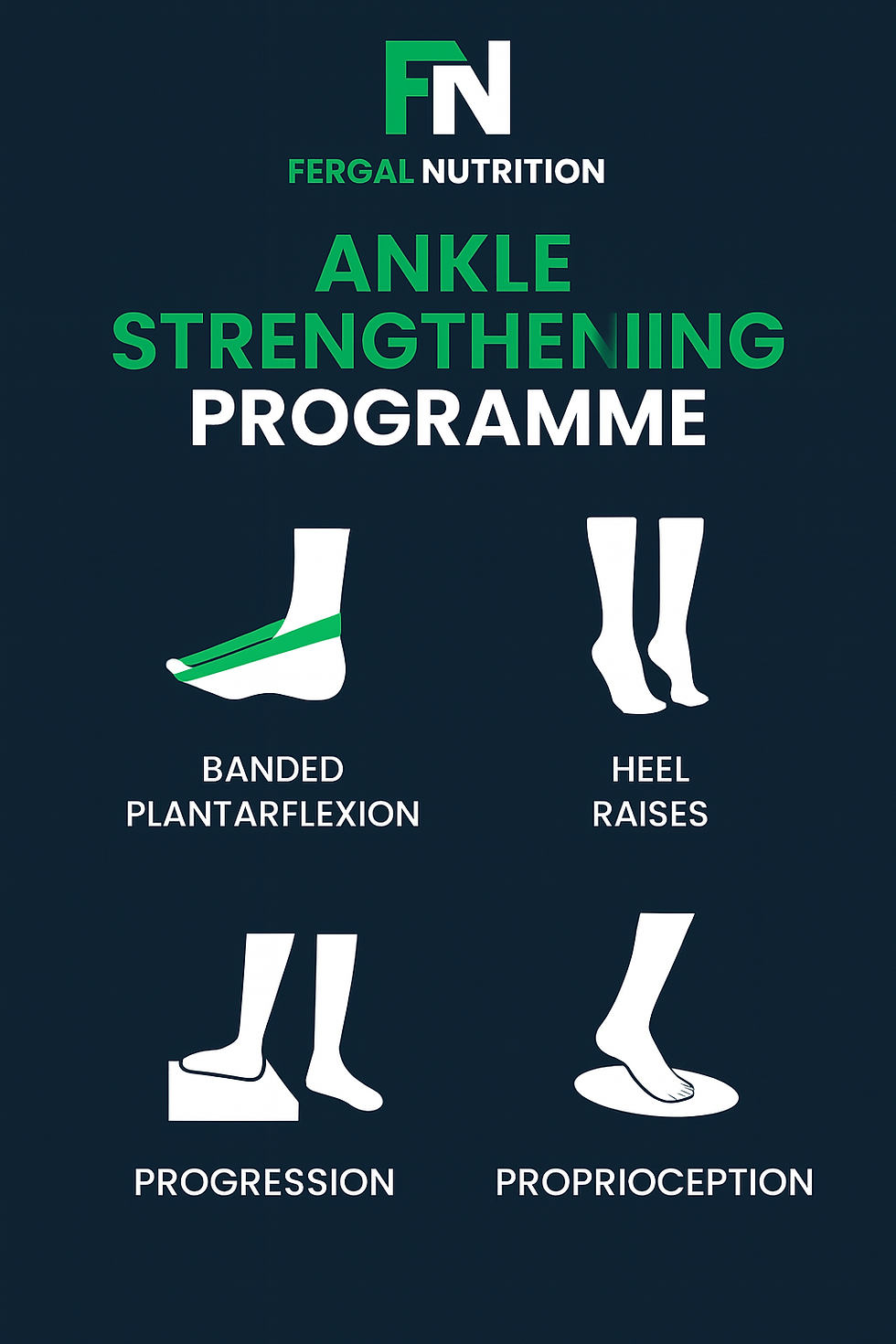Ankle Strengthening and Proprioception Program: Prevent sprains and build stability
- fitzmauricefergal
- Jul 8, 2025
- 3 min read

This programme came on the back of an enquiry in the gym today. As someone who badly sprained both ankles while training for the mountain running world championships. If you've ever experienced an ankle sprain, you know how frustrating and painful recovery can be. Weak or unstable ankles are one of the most common causes of injury — not just in athletes, but in walkers, runners, and everyday gym-goers.
As a personal trainer and Pilates instructor based in Pontcanna, Cardiff , I have had to help clients build stronger ankles through a blend of strength, mobility, and proprioception exercises. Whether you're recovering from an injury or simply want to improve your balance and lower-body strength, this 3-phase ankle strengthening program is a game-changer.
✅ Why You Need Ankle Strengthening
Your ankles are responsible for supporting your entire body weight, absorbing shock, and adjusting to uneven surfaces. Weak ankles can lead to:
Recurring sprains
Poor balance
Knee and hip pain
Reduced performance in sport and exercise
Incorporating ankle-specific work can improve your overall stability, coordination, and resilience to injury.
🔄 The 3-Phase Ankle Strength & Proprioception Program
This progressive plan builds from gentle mobility work to dynamic plyometric drills. It can be done at home, in the gym, or as part of your rehab or training routine.
🟢 Phase 1: Activation & Basic Strength (Weeks 1–2)
This phase builds foundational ankle strength and begins to engage proprioceptive control (your body’s awareness of joint position).
Exercises:
Ankle Alphabet
Towel Scrunches
Resistance Band Dorsiflexion & Plantarflexion
Single-Leg Balance (Eyes Open)
🧠 Focus on control and technique here – not speed or resistance.
🟡 Phase 2: Strength & Control (Weeks 3–5)
Once your basic strength is established, it’s time to challenge the stabilising muscles more directly and add mild instability.
Exercises:
Single & Double-Leg Calf Raises
Lateral Band Walks
Band Eversion/Inversion
Single-Leg Balance (Eyes Closed)
Heel-to-Toe Walks
🧠 This is where you'll start to feel stronger in everyday movement – walking, climbing stairs, or during exercise.
🔴 Phase 3: Dynamic Proprioception & Power (Weeks 6–8+)
Here, we add explosive power, reaction training, and multi-directional control – ideal for athletes and active individuals.
Exercises:
Single-Leg Hops (Forward, Backward, Side)
Bosu Ball or Balance Pad Work
Jump-to-Balance
Skater Hops
Agility Ladder Drills
🧠 Think sports performance, quick reaction time, and resilient joints.
🧘♂️ Proprioception: The Missing Link
Proprioception is your body’s internal GPS — helping you stay upright, balanced, and aware of movement without needing to look down. It's essential for:
Preventing falls
Navigating uneven ground
Making quick athletic movements
Every phase of this program includes proprioceptive training to help build confidence and control from the feet up.
👣 Who Is This Program For?
Anyone with recurrent ankle sprains
Runners, dancers, footballers, and court-sport athletes
Older adults wanting to improve balance and fall-prevention
Pilates clients looking to strengthen their foundations
People recovering from ankle injuries (always check with a physio or GP)
📍 Based in Cardiff? Work with Me 1:1
As a qualified personal trainer and Pilates instructor in Pontcanna, I offer customised injury prevention and recovery programmes to help clients move better, feel stronger, and stay injury-free.
👉 Whether you're coming back from injury, preparing for a sport, or want a tailored Pilates plan to improve ankle strength and posture, I’d love to help.
📩 Enquire about a session today or follow me on Instagram @fergalnutrition
🧠 Final Thoughts
Ignoring weak ankles is like building a house on shaky foundations. This simple but effective program helps restore strength, balance, and confidence — from your feet upward.
Want a printable version or PDF? Drop me a message and I’ll send you the full plan with images and progress tracking.



Comments